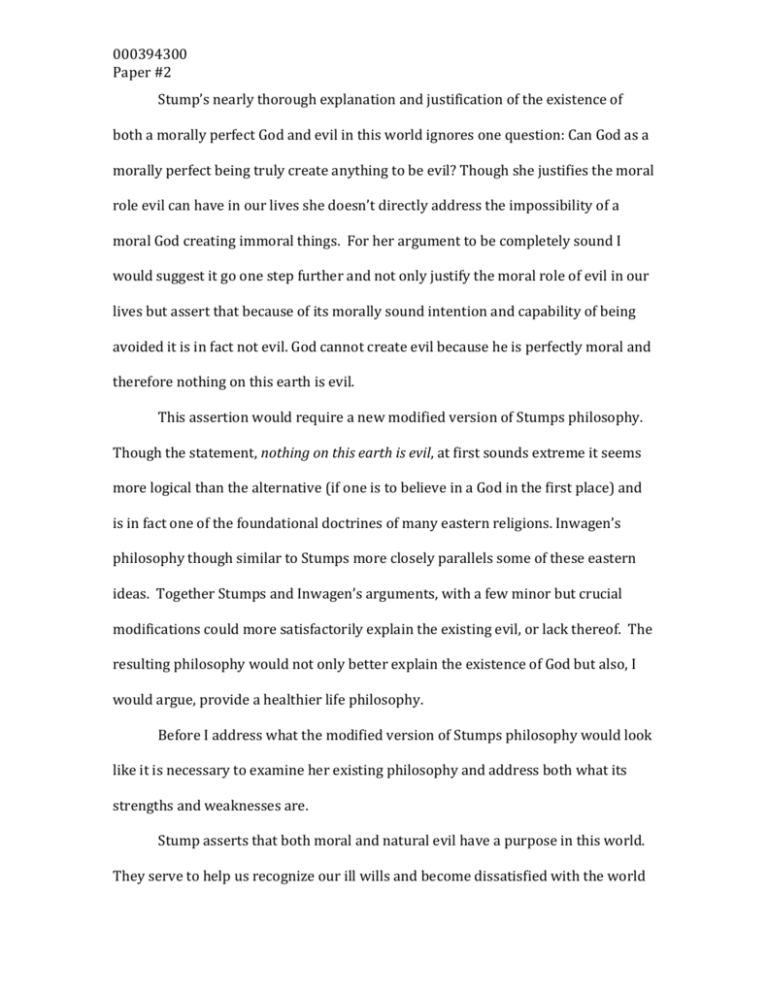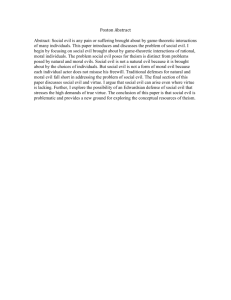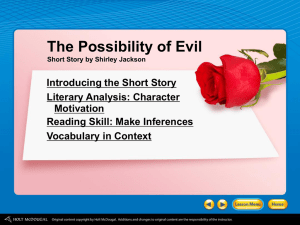The Problem of Evil
advertisement

000394300 Paper #2 Stump’s nearly thorough explanation and justification of the existence of both a morally perfect God and evil in this world ignores one question: Can God as a morally perfect being truly create anything to be evil? Though she justifies the moral role evil can have in our lives she doesn’t directly address the impossibility of a moral God creating immoral things. For her argument to be completely sound I would suggest it go one step further and not only justify the moral role of evil in our lives but assert that because of its morally sound intention and capability of being avoided it is in fact not evil. God cannot create evil because he is perfectly moral and therefore nothing on this earth is evil. This assertion would require a new modified version of Stumps philosophy. Though the statement, nothing on this earth is evil, at first sounds extreme it seems more logical than the alternative (if one is to believe in a God in the first place) and is in fact one of the foundational doctrines of many eastern religions. Inwagen’s philosophy though similar to Stumps more closely parallels some of these eastern ideas. Together Stumps and Inwagen’s arguments, with a few minor but crucial modifications could more satisfactorily explain the existing evil, or lack thereof. The resulting philosophy would not only better explain the existence of God but also, I would argue, provide a healthier life philosophy. Before I address what the modified version of Stumps philosophy would look like it is necessary to examine her existing philosophy and address both what its strengths and weaknesses are. Stump asserts that both moral and natural evil have a purpose in this world. They serve to help us recognize our ill wills and become dissatisfied with the world 000394300 Paper #2 resulting in inward reflection, recognition of our own poor actions, and the need for our wills to be altered in order to escape our suffering and dissatisfaction. This desire to alter our own wills requires that we turn to God and plea that He help fix us. A skeptic may ask why we have defective free wills in the first place and why God can’t simply fix our defective wills. Stump answers both of these questions by explanation of the fall and the need for free will. First, “all human beings since Adam’s fall have been defective in their free wills, so that they have a powerful inclination to will what they ought not to will, to will their own power or pleasure in preference to greater goods”(p230). God created us with free wills to choose an existence without distancing ourselves from God but we did not choose this path and in so doing created a gap, which led to the defect in our wills. Instead of willing what we ought, we are now born with a powerful inclination to will what we ought not, according to Stump. As a result of our ill wills we often perform moral evil by intentionally causing suffering to others. Even if we recognize these acts to be wrong our defective wills encourage us to actualize them. Humans are currently attempting to reach a state that restores their initial good wills. God cannot intervene by simply changing our wills because doing so without permission takes away our free will and we are then perfected without being asked and without even recognizing our previous defect. Instead we are given the chance to recognize our defective wills and therein turn to Christ with the desire for Him to change us. He can then change our wills for us without taking away our free will because we chose it. 000394300 Paper #2 This state of correction is a slow process according to Stump because God can only alter what we ask Him to correct and are willing to correct. Due to our defective natures we are blind to how actually defective we are and it takes gradual enlightenment. The existence of natural evils, hurricanes, tornadoes, etc., acts to bring about human enlightenment. The world exists as it does to bring about the most effective process of human sanctification. For this sanctification to occur, one must desire not to be in their existing condition of defective will, “He must, in other words, have both a humbling recognition of himself as evil and a desire for a better state. Occurrences that contribute to a person’s humbling, to his awareness of his own evil, and to his unhappiness with his present state, contribute to him willing God’s help”(p 233). Natural evils will not guarantee that man will seek God’s help, but Stump believes they are the best hope and most effective means. Stump believes the biggest objection people will have to her argument is justifying the suffering of children. Her justification is that children who suffer and die will reach heaven immediately. The suffering then seems like a small price to pay for eternity in paradise. This however does not seem to fully justify allowing suffering to happen to the innocent. I would propose here that if the ultimate goal of life for a theist is heaven then better an innocent person assured of reaching heaven suffer and die than a sinful man suffer and die when he is destined for hell. I am not going to elaborate much further on this topic however because I feel regardless of what defense I or anyone else could provide in its defense, people will always feel unsatisfied knowing children suffer. Our human obsession with justice makes it hard to accept innocent people having horrible things happen to them. 000394300 Paper #2 Stump feels her defense of child suffering is her weakest argument. I however disagree. Even though I recognize most humans feel unsatisfied believing a God could allow the innocent to suffer, I believe the bigger issue with Stump’s philosophy is her admitting that a morally perfect God could create evil in the first place, and so for this paper, I will focus primarily, first and foremost on this issue. If one were to tweak Stumps philosophy to better answer the paradox of God creating evil it would look a lot more Buddhist in nature. Many eastern philosophies assert that if God Is perfectly moral and God created everything in this world then nothing in this world can be evil. They suggest that our suffering is a result of ignorance and claim therefore that ignorance is the only sin. Inwagen’s explanation of the fall has close ties to Buddhism because like Buddhism it asserts that ignorance is the dividing factor. Inwagen suggests that before the fall with God’s close presence any natural evil was harmless because humans would know how to avoid it. The choice to separate ourselves from God then resulted in our own suffering due to ignorance of how to escape natural evils. This would imply that evil exists because we are unable to avoid the suffering that comes from it and unable to perceive its true nature. Evil is often defined as anything that causes intentional suffering. If Humans were capable of avoiding suffering then these so called evil acts would no longer be evil. If the intention of these said evil acts is to create good, happiness, and (in the long run) the opposite of suffering these acts are no longer evil. One could therefore argue that all said-evil acts and occurrences in this world are in fact not 000394300 Paper #2 evil because they one, need not cause suffering and two were intended to lead towards ultimate happiness. Under this premise one must accept that humans can reach a state where suffering is avoidable. Stump suggests this state can only truly be actualized in heaven because our defective natures can’t be completely corrected until then. Inwagen suggests that we are in a period of human atonement heading toward a time when “there will never again be undeserved suffering or any other sort of evil.” To God, an eternal being, this period could last for a very long time and still seem merely like a flicker in His eyes. For the Buddhist all suffering lies in the mind and can therefore be corrected by a change in the state of our minds. If evil exists this is a result of our inability as Human’s to escape suffering in our current states. If God provides the ability to escape these current states He is not evil. Buddhists believe everyone is capable of escaping any and all suffering. We were in other words created with the capabilities of reaching nirvana/ultimate happiness; we simply need to actualize this state. It is therefore not paradoxical that God created us with the ability to perceive evil in this world because He simultaneously created us with the ability to avoid it. By making it difficult for happiness, the opposite of suffering and evil, to be attained it is more fruitful when actualized. To say that the existence of evil is a matter of perception and our inability to escape suffering can sound as unsatisfying as the theist claiming we can never understand why suffering exists and that humans because of the fall are defective and can therefore never escape sin and suffering. Though this may be true, the 000394300 Paper #2 claim that suffering is a fault in our perception asks us to find ways to escape the pain from suffering and look at it in a new positive light. The theistic argument differs in that it provides an incomplete solution. We can ask God for help but He can’t change us completely and our own sinful natures will perpetuate the cycle. Not only is it an incomplete solution it is a solution that asks us to change our very being instead of becoming one with our own nature. This I feel is an important distinction between eastern and western religious philosophies. Believing we are evil beings is setting humans up to fail. Saying we have to try to be what we are not – is something most people would scoff at and suggest to be too much work, regardless of the benefits. By simply reversing this and suggesting that humans are in fact moral beings sets humans up to succeed because it suggests that acting in any way contrary to our true natures is silly and unsatisfying. Stumps philosophy tells us that our wills are defective and that we must act in a way contrary to our true nature. This sounds both challenging and a hopeless expectation for us to be able to change into something we are not. Its no surprise Stump says we need God’s help to accomplish such a feat because this seems nearly impossible. Asking God to help us see our own true natures better seems much more plausible and a lot more possible. Under this premise our goal is to simply become more ourselves to attain happiness rather than less ourselves as Stump’s philosophy seems to imply. Furthermore, Stumps philosophy by admitting in the existence of evil in the world on a basic level also encourages humans to perceive the world negatively. 000394300 Paper #2 Stump admitting natural evils occurs only as a result of the fall merely adds to the pessimism by suggesting we are meant to be punished and deserve in some way the evil that befalls us. Alternatively if one thought the world to be a place that isn’t evil and that seeing evil is therefore a defect in our own perception they could work on perceiving all natural evils as values, lessens - occurrences that happen out of love to teach and don’t need to result in suffering rather than occurrences that are evil, result of our poor choice, and unavoidable. Even Stump admits evil exists as instances meant to teach us, she simply falls short of admitting their moral intentions makes them no longer evil. The small distinction I think would make a large difference. Viewing the fall as evil, makes one feel like its inescapable and there is nothing they can do. Stump proposes turning to God. Buddhists suggest seeking enlightenment, seeking to understand the world as it really exists - sinless, free of evil, and free of suffering. This distinction makes it possible for the Buddhist to find happiness in the here and now whereas the Christian believes they must wait till heaven and cannot escape suffering because they are defective. Though I do not find the distinctions between Stumps philosophy and eastern philosophies to be that large – mostly just a change in wording, I do believe the effects of these distinctions to be magnanimous because it’s the difference between believing one can do something here and now and the defeatist nature of one who thinks they are diseased and can only escape through death. Stump’s philosophy is satisfying in that it seems to logically support the existence of evil and justify its role in our lives, however by still calling it evil she fails to completely satisfy one’s confliction over accepting a God who is both morally 000394300 Paper #2 perfect and can somehow create evil. The logical alternative is to say that God does not create evil but rather we as humans perceive it to be evil, either due to our lack of omniscience, distance from God, inability to see his rationale, limited perceptions or all of the above. Though this can be somewhat unsatisfying as well because it implies a fault in our own perception – I believe that correcting our perception is more easily attainable than attempting to change our true natures as Stumps philosophy suggests. The solution then would be to try to shrink our distance from God so that we can someday perceive what we see as evil for what it really is – not evil, a lesson, an act of love, and something we can learn from but not have to suffer because of. This to me is a much more positive solution than having to wait for heaven and suffer in the mean time. If one is to accept that God exists it is counterintuitive to say He is both perfectly moral and the creator of evil. If one is to believe that God is all good then they logically ought to believe that evil does not exist and therefore suffering is not a matter of evil at all but something we can avoid, learn from, and derive good out of. If one is to deny this and refuse not to reject the existence of evil, it would be illogical for them to believe in a morally perfect God.









